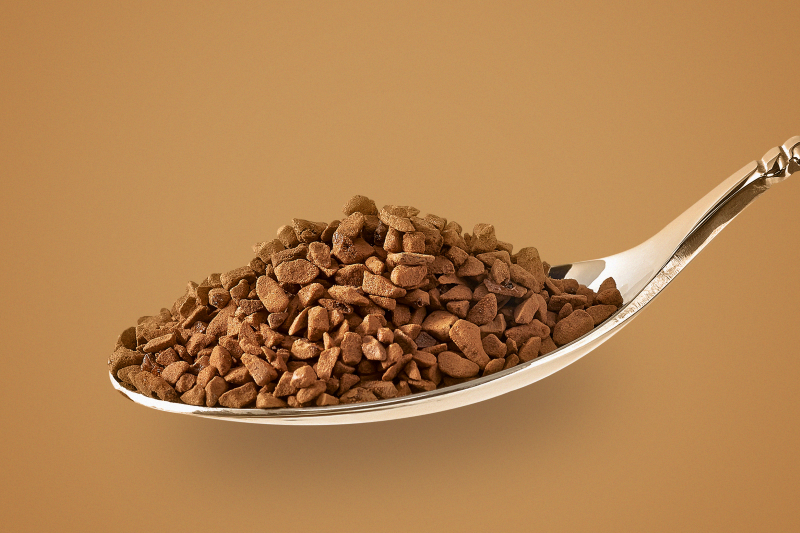Upping the game in instant coffee

Image: Brazilian Soluble Coffee Industry Association (ABICS)
A new methodology, the first of its kind, assesses the quality of instant coffee by its attributes and intensity and not by scores. This concept, developed by ABICS, enables consumers to select coffees according to their preferences, including the methods of consumption. By Vanessa L Facenda
Perhaps more than decaf coffee, instant coffee has the most stigma associated with it as consumers in many global markets perceive the quality to be low. And yet, instant coffee accounts for 25 percent of the coffee consumed in the world, with consumption growing at about 2 percent annually. In Brazil, instant coffee accounts for 5 percent of the total coffee consumed in the country, with consumption growing at an average of 3.5 percent per year since 2016.
The International Coffee Organization (ICO) stated in its March 2023 report that total exports of soluble coffee increased by 5.8 percent in February 2023 to 0.92 million bags from 0.87 million bags in February 2022. In the first five months of coffee year 2022/23, a total of 4.59 million bags of soluble coffee were exported, representing a decrease of 11.2 percent from the 5.09 million bags exported in the prior-year period. Soluble coffee’s share in the total exports of all forms of coffee was 10.2 percent (measured on a moving 12-month average) in February 2023, up from 10.1 percent in February 2022.
Aside from being the largest coffee producer, Brazil is also the largest exporter of soluble coffee, shipping 0.3 million bags in February 2023, per the ICO. Brazil’s instant coffee sector has incorporated new technologies and expanded its industrial capacity to help maintain its leading global position. Brazil exports soluble coffee to 100 countries, exceeding four million bags every year.
Nonetheless, the opinion of instant coffee in many major coffee-consuming markets remains low. The Brazilian Soluble Coffee Industry Association, or ABICS, is working to alter the perception of instant coffee. In November 2022, during Brazil International Coffee Week (SIC – Semana Internacional do Café), ABICS, in cooperation with the Institute of Food Technology (ITAL), announced the launch of a new methodology for quality assessment that proposes a sensory lexicon and quality grades for instant coffees.
The development of this new methodology for soluble, which uses contemporary sensory science, began in 2019 with the participation of experts from all instant coffee companies operating in Brazil as well as domestic and international consultants, using the main instant brands in the Brazilian market and abroad. The methodology, the first of its kind, assesses quality by its attributes and intensity — not by scores. This concept enables consumers to select coffees according to their preferences, including the methods of consumption. That is, consumers may choose which instant coffees are best suited for black coffee, with milk/dairy alternatives, cappuccinos, beverages or gastronomy (cooking, baking, etc.).
The need for instant coffee quality assessment
Any coffee may be turned into instant coffee, yet the soluble process itself, noted ABICS researchers, may add another layer of quality as it modifies to a certain extent the raw material flavour — that is, sometimes a strong over-extracted coffee flavour may be imparted, while other times, the flavour of the raw material may be preserved. Thus, the range of qualities for instant coffee is quite wide, and ABICS believes that the value and price of these products should vary accordingly.
However, as ABICS states in its recently released white paper, Quality Assessment of Instant Coffee: A Sensory Science Development, while roasted whole bean and ground coffee count with globally recognised grading systems, such as the Specialty Coffee Association (SCA) Cupping Protocol, instant coffee products have lacked a system to assess their quality and display it to consumers transparently. Per the report, “for that reason, consumers struggle to understand why they should pay price premiums for certain types of instant coffee. The instant coffee category has not effectively communicated to consumers about the quality diversity of instant coffees, how quality ties to the flavour they should expect and why it is fair to pay premiums for high quality.”
Coffee quality has long been assessed by expert, well-trained tasters – coffee cuppers – who grade coffee based on their appreciation of quality. However, assessment can vary greatly because there is no consensus about the level desirability or undesirability of an attribute. For example, a ‘citrus’ flavour may be positive to some, but could be negative to others, which directly impacts the coffee they purchase.
The reasoning behind the new methodology, according to ABICS, is that if consensus is achieved around the desirability or undesirability of a given attribute, it is possible to bypass the need for affective judgement by a taster and grade the quality of instant coffee based on intensity of several desirable or undesirable attributes. Therefore, grading would now be the objective of assessment, as the quality score is no longer the product of an effective assessment, rather, it is the result of the presence and intensity of several desirable or undesirable attributes in the coffee. ABICS researchers said this would allow coffee tasters to act as descriptive tasters, rating the intensity of several flavour attributes, and the score or the grade of the coffee given because of the ‘desirability weights’ of such attributes.
Furthermore, the researchers explained that applying the ‘descriptive based’ quality grading to instant has multiple advantages:
- it shows there is consensus among the instant coffee industry about what attributes are more desirable than others;
- it shows modern sensory science tools may be applied to the instant coffee category to stimulate transparent product differentiation, and
- it endows the instant coffee category with a language to speak to consumers about flavour and quality in a way they will understand.
Eliana Relvas, of ABICS, who was one of the lead developers of the methodology, said that the levels are not about quality, rather, how you apply it. “This is all for consumers — we want to communicate the descriptors to consumers to help remove the prejudice of instant coffee,” she said at the unveiling of the new methodology, adding, the attributes apply to everyone — some may like chocolatey, some nutty, some fruity, etc. It’s not about the quality, it is about the descriptors.”
The first step towards creating a descriptive-based system for instant coffee was to identify key flavour attributes in instant coffee. The second step was to identify the links between each of the key flavour attributes and perceived quality to create a ‘desirability’ weight of each attribute. The third step is to propose a testing and grading method for instant coffees, based on the intensity of key flavour attributes.
There are three category descriptors: Excelence, Premium and Classic. “ABICS decided to rename the categories so as not to imply that one category is better than the other,” said Fábio Sato, president of ABICS. (At the launch of the methodology, the category descriptor names were excellent, differentiated and conventional.)
Dr Aline Garcia of the Institute of Food Technology (ITAL), who was the scientific researcher for the new methodology, reiterated that while the methodology has some relationship to qualities, “it is really about the descriptors.”
Current and next steps
The new methodology is currently for the Brazilian market only but ABICS said it will be offered to other countries as the descriptive aspects of the system could be adapted by global organisations. There is room for growth with the methodology because the descriptors/attributes are terms that consumers understand,” said Relvas.
Six months after the launch of the new instant coffee quality assessment methodology, Sato said it is not yet fully rolled out in Brazil. ABICS is about to start training specialists in the varied Brazilian coffee industries (those who did not participate in the creation of the protocol). “We believe that it is very important that all specialists of Brazilian industries are aligned and trained on the methodology and adopt it in their respective companies.”
Sato said that ABICS together with its associates, who are present in the market with their respective brands, are now working on a project to communicate to consumers the main attributes and applications according to the methodology, by placing a quality seal on the packages.
If successful in Brazil, this new system for assessing instant coffee does have the potential to be a game changer for international soluble markets. Although ABICS has not yet defined which will be the first international market to be approached, Sato shared that the association is “in contact with some associations and entities to discuss opportunities to introduce the protocol.”
- Vanessa L Facenda joined T&CTJ in 2012 as editor. She was previously editor of Retail Merchandiser and has written for a variety of magazines including Consumer Reports, Brandweek, Adweek, Hollywood Reporter, and Specialty Food Magazine, among many others. She may be reached at: [email protected].



